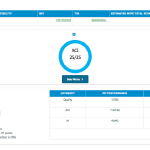The investigators broke down select socio-demographic and clinical characteristics of the 239,302 patients captured in the system, as well as generated a list of ICD-9 codes of common rheumatic diseases. They also examined clinical data from a subset of patients with RA (n=60,102), because RA was initially a key focus of the registry. Within this group, 34% were using a biologic or targeted synthetic disease-modifying anti-rheumatic drug (DMARD) (n=520,759), while 67% were using a nonbiologic DMARD (n=540,272). Twenty-three percent of patients were on biologic DMARD monotherapy.
Of the quality measures analyzed, investigators found that 55.2% of patients had a disease activity score recorded, with the most commonly used outcome measures being Routine Assessment of Patient Index Data 3 (RAPID-3; 56.0%) and Clinical Disease Activity Index (36.9%). Fifty-three percent of patients had a functional status score, and 91.0% were taking a DMARD in the last year.
Also, “across all measures, performance was highest for a measure regarding medication reconciliation (96.8%) and lowest for serum urate monitoring in gout patients (31.0%),” note the authors.
“By aggregating, analyzing, and continuously feeding data back to rheumatology practices, RISE aims to advance our shared goals of improving knowledge about rheumatologic conditions, refining treatment strategies and outcomes, and improving the quality and safety of care,” write the authors.
Yazdany J, Bansback N, Clowse M, et al. Rheumatology informatics system for effectiveness: A national informatics-enabled registry for quality improvement. Arthritis Care Res (Hoboken). 2016 Dec;68(12):1866–1873. doi: 10.1002/acr.23089.



